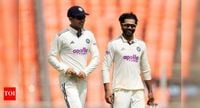India’s home Test campaign for the 2025–27 ICC World Test Championship could not have started on a more dominant note, as the hosts bulldozed the West Indies by an innings and 140 runs at the Narendra Modi Stadium in Ahmedabad. Wrapping up the contest in just 2.5 days, India’s emphatic victory left fans jubilant and critics pondering the deepening woes of Caribbean cricket. The win, sealed on October 4, 2025, not only gave India a crucial boost in the World Test Championship standings but also laid bare the stark contrast between the two sides’ current fortunes.
From the outset, the gulf in quality was unmistakable. India’s bowlers, led by a fiery Mohammed Siraj, set the tone early by reducing West Indies to a paltry 162 in their first innings. Siraj’s four-wicket haul was ably supported by disciplined spells from the rest of the attack, ensuring the visitors never found their footing. The West Indies’ struggles against both pace and spin were all too evident, as they succumbed to relentless pressure and failed to bat even 90 overs across both innings—a telling statistic that underscored their vulnerability.
When it was India’s turn to bat, the home side seized control with a clinical display. KL Rahul anchored the innings with a composed 100, while young wicketkeeper Dhruv Jurel dazzled with a fluent 125. The real star, though, was Ravindra Jadeja, who celebrated his 50th home Test with an unbeaten 104. Jadeja’s performance was especially poignant, marking his first Test at home without the legendary Ravichandran Ashwin, who retired the previous December. “I was playing a (Test) match in India without Ash for the first time, so sometimes I did find myself thinking, yeah, Ash will come on and bowl, and then realising he isn't there,” Jadeja reflected after the match. “But Kuldeep (Yadav) and Washy (Washington Sundar) have already played so many matches, and we can't call them youngsters, but it was a different combination. In the future you will ask, Jaddu isn't here, and someone else will be there. This is inevitable, but it feels good to contribute to the team.”
India eventually declared at 448/5, leaving the West Indies with an insurmountable mountain to climb. The visitors’ second innings fared no better. Alick Athanaze (38) and Justin Greaves (25) offered brief resistance, but the combined threat of Siraj and Jadeja proved too much. Jadeja, named player of the match, capped off his all-round masterclass by taking four wickets in the second innings, while Siraj added three more to his tally. The West Indies were bowled out for just 146, sealing their defeat inside three days.
For the West Indies, this loss was the latest in a string of disappointing performances. The team has crossed the 250-run mark only once in its last 15 Test innings, a damning statistic that speaks volumes about their ongoing struggles. Test captain Roston Chase did not shy away from addressing the harsh realities facing his side. “I think the systems in the Caribbean are a bit poor in terms of training facilities and stuff,” Chase admitted after the match. “I am not using that as an excuse or something to hide behind for poor performances that we’ve been putting out lately. I still think that the onus is on the players to find some way to churn up runs and wickets and stuff. But what I would say is, yes, there is obviously a struggle in the Caribbean for finances. So, whatever help we can get, if they are planning to get the help, I hope that we do get it so that we could strengthen the infrastructure for cricket.”
Chase also pointed to the nature of pitches and outfields back home as contributing factors. “The pitches in the Caribbean are not really batsman-friendly. So guys don’t really bat for long periods and score those big scores. And the outfields in the Caribbean are really slow. When you hit the ball in the gaps, you probably end up struggling to get two. Those are just some of the problems that we are faced with in the Caribbean.”
The West Indies’ woes were compounded by the absence of premier pacers Alzarri Joseph and Shamar Joseph, both sidelined with injuries. Their replacements struggled to make an impact, with only Jayden Seales showing glimpses of promise. Legendary Indian batsman Sunil Gavaskar, writing in his Sportstar column, did not mince words regarding the state of the West Indies pace attack. “To see their new-ball attack in the first Test in Ahmedabad was a shock to those who have grown up seeing the ball whistle past the batters’ noses at least two or three times in an over,” Gavaskar observed. “In Ahmedabad, apart from Jayden Seales, the other two were simply trundlers, who looked more like net bowlers than international ones. No disrespect intended to them, but to see the first bouncer being bowled after half a dozen overs had been bowled made one ask, ‘Is this really the West Indies pace attack?’”
Gavaskar’s reflections carried a note of sadness, echoing the sentiments of cricket lovers worldwide who remember the once-mighty West Indies teams of the past. “The ease with which India won the first Test match in Ahmedabad was no doubt wonderful to watch for Indian cricket fans, but at the same time, it was saddening to see the depths to which the West Indies, a once invincible team, had fallen,” he wrote. “There is not a cricket lover in the world who isn’t disappointed by the performances of the West Indies Test teams over the last couple of decades or so. Go around the cricketing world, and even those former players who suffered at the hands of the great West Indies teams of the 1960s to early 2000s feel frustrated at the performances.”
On the flip side, India’s victory propelled them to third place in the ICC World Test Championship standings, boasting a 55.56% points percentage after six matches. With Australia and Sri Lanka occupying the top two spots, the Shubman Gill-led side has gained vital momentum as they look ahead to the series decider in Delhi. The next Test, set to begin on October 10, 2025, at the Arun Jaitley Stadium, promises another stern test for the beleaguered West Indies.
As the dust settles in Ahmedabad, the contrasting fortunes of the two teams could not be more stark. For India, the challenge will be to maintain their ruthless consistency and build on this momentum. For the West Indies, the road to redemption looks long and arduous, but as captain Chase put it, “We are going to take small steps and climb back up.” With the series moving to Delhi, all eyes will be on whether the visitors can regroup and offer stiffer resistance—or if India will continue their march towards WTC glory.


